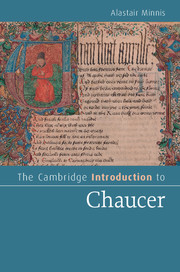Book contents
- Frontmatter
- Contents
- List of illustrations
- List of abbreviations
- Introduction Life and historical contexts
- Chapter 1 Love and lore: the shorter poems
- Chapter 2 Fictions of antiquity: Troilus and Criseyde and The Legend of Good Women
- Chapter 3 The Canterbury Tales, I: war, love, laughter
- Chapter 4 The Canterbury Tales, II: experience and authority
- Afterword
- Notes
- Further reading
- Index
Chapter 1 - Love and lore: the shorter poems
Published online by Cambridge University Press: 05 October 2014
- Frontmatter
- Contents
- List of illustrations
- List of abbreviations
- Introduction Life and historical contexts
- Chapter 1 Love and lore: the shorter poems
- Chapter 2 Fictions of antiquity: Troilus and Criseyde and The Legend of Good Women
- Chapter 3 The Canterbury Tales, I: war, love, laughter
- Chapter 4 The Canterbury Tales, II: experience and authority
- Afterword
- Notes
- Further reading
- Index
Summary
Some twenty-two short poems have been attributed to Chaucer. In general they reflect the influence of French courtly verse, and it is reasonable to assume that Chaucer may have composed some courtly verse in French that is no longer extant. An impression that much more was written (in whichever language) than has survived is conveyed by the statement in The Legend of Good Women that Chaucer made: ‘many an ympe [hymn]…| That highten balades, roundels, virelayes’ for the God of Love (F Pro 422–3; cf. G Pro 410–11). A measure of rhetorical exaggeration is obviously involved here, and the short poems we do have range far beyond the context of fyn lovynge, as Chaucer terms the aristocratic way of love (LGW F 544). Yet the strong possibility remains that the present corpus is only a small fraction of what once existed.
Setting apart the intercalated lyrics – self-contained texts that feature within longer, narrative works – Chaucer’s short poems can be classified only in rather broad and sometimes shifting terms, and many of them may be placed in more than one group. First may be listed a number of ‘complaint’ poems, which lament ‘some loss incurred or injustice suffered or grief experienced’: The Complaint of Venus, The Complaint of Mars, The Complaint unto Pity, Anelida and Arcite, A Complaint to his Lady, Compleynt d’amours, and A Balade of Complaint. The Complaint of Chaucer to his Purse, in which Chaucer appeals to King Henry IV to pay him the annuity he is owed, could also be included here, but it is usually thought of as a ‘begging’ poem, as is the Lenvoy to the well-placed Henry Scogan, whose support and patronage the poet seeks. Furthermore, the balade to Fortune ends with Fortune herself asking ‘princes’ to help this petitioner to ‘som beter estat’, so that he will stop crying out and complaining to her. Returning to the earlier-mentioned complaints: all of them are amatory laments, wherein pagans gods or first-person narrators express the sufferings they are enduring for love. Another group of love poems, Womanly Noblesse, To Rosemounde, Merciles Beaute and Against Women Inconstant, are in either ballade or roundel form.
- Type
- Chapter
- Information
- The Cambridge Introduction to Chaucer , pp. 12 - 34Publisher: Cambridge University PressPrint publication year: 2014

